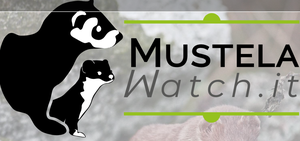National project on the biology and conservation of skunks and weasels in Italy
MustelaWatch.it is the Italian portal dedicated to skunks and weasels designed and created by the Italian Mesocarnivore Research Group (GrIMeC) of the Italian Theriological Association (ATIt). It contains news on the species, insights, publications, as well as distribution maps updated in real time, with recent data and new acquisitions. Anyone can contribute by sending photos or links to videos (including from camera traps), with date and location. A team of specialists will validate the observations, which – once verified, will appear on the map.
The skunk Mustela putorius and the weasel Mustela nivalis are two carnivores belonging to the Mustelidae family. The weasel is the smallest carnivore in the world. The skunk is a species of community interest, protected by law 11/02/1992 n.157, included in Appendix V of the Habitats Directive (92/43/EEC) listed in Annex III of the Bern Convention.
Italy is required under the Habitats Directive to report every 6 years to the European Commission on the state of conservation of the species in Italy, quantifying the distribution area, the population and the state of its habitat. The weasel is listed in Appendix III of the Berne Convention. Although considered a species of least concern, there is no adequate information on the status of the species in Italy.
Through the mustelawatch.it portal, the national skunk and weasel project intends to achieve the following objectives:
- Improve knowledge on the distribution and status of the species in Italy
- Promote the systematization of occasional data collection by citizens and voluntary organizations.
- Encourage the collection of data on presence and opportunistic observations or even from research projects/studies, by researchers and professionals, starting from the involvement of ATIt members and GRiMeC members
- Create a portal for the collection and use of data on skunks, connected and integrated with the National Biodiversity Network.
- Contribute, through the project, to reporting on the conservation status of the species envisaged by the Habitats Directive
ISPRA is partner of the project

